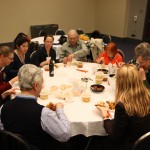You know you’re back in college when conversations start, “So, what are you studying?” But when I replied to this question at a recent dinner gathering of fellow grad students, I got an unexpected response. I explained that I was learning how to communicate science to the general public, but a computer engineer offered this interpretation: “You mean you oversimplify it.” The molecular biologist at the table thought science writers more prone to exaggeration.
Like Sandeep, I am also struggling with an inner ‘science robot’ writer, and I wonder if some part of my lingering attraction to passive voice, scientific terminology, and conditional wording stems from a fear of facing charges of simplifying or sensationalizing complex subjects.
In the four short weeks since classes started we have already seen such forces at work. I enjoyed reading Keith’s exploration of the way a minor scientific disagreement about earthquake timing was amplified by the press. Keith also wrote about how journalists seemed eager to pounce on the conflict-of-interest angle when covering Terry Hazen’s study of oil-eating bacteria in the Gulf of Mexico. In August, the Knight Science Journalism Tracker featured a post on Hazen’s research and “why daily journalism is a terrible way to cover science”.
I’d also like to share the following article from Harvey Mudd College’s news magazine. HMC is my alma mater and describes itself as a liberal arts college of math, science, and engineering. The author of the article, Kate Lain, writes from a film director’s perspective, but how many of her points could apply to science writers as well?








Comments are closed.